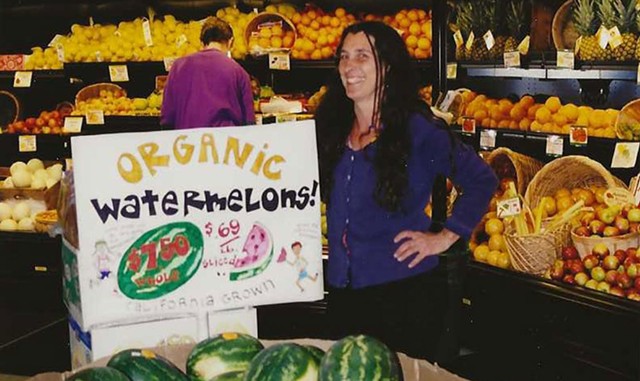
- Courtesy
- Mary Manghis at City Market
By the time of the co-op's controversial 2002 relocation downtown, Mary had moved from part-time cashier to produce buyer. The shiny new 12,000-square-foot City Market, Onion River Co-op building on South Winooski Avenue was not only a huge physical change but a cultural leap. Then-colleague Annie Harlow said Mary was among those who "grappled initially" with how the co-op could stay true to its homegrown, antiestablishment ethos.
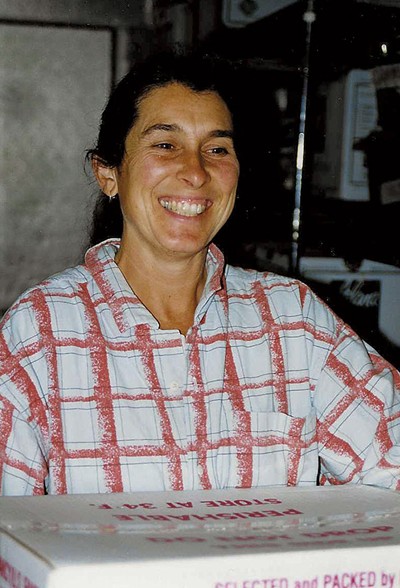
- Courtesy
- Mary Manghis at City Market
"She wasn't sure she wanted to move with the store, because it was going to be a combination store: a big supermarket with less natural food," Harlow said. "She thought it would dilute the community."
After careful consideration, Mary concluded that a larger co-op could have a bigger positive impact on Vermont farms and help more people eat locally grown, healthy food, Harlow said. Once Mary decided to stay, "She was 100 percent all in."
That was the case with whatever Mary did: biking everywhere in all kinds of weather; throwing herself into the drum rhythms of West African and Afro-Caribbean dance; and lavishing care on her gardens, where blooms in shades of her favorite purple complemented the lilac-clapboarded Old North End home that Mary shared with her partner of 43 years, Glenn Eames.
At City Market, "she put care into the smallest things, because something as simple as arranging the garlic neatly showed respect for both the grower and the customer," coworker Sarah Zareva said. "She did this because she felt providing food was the root of community."
Over her 21 years as the co-op's Burlington produce buyer, Mary championed local farms but never coddled them. With clear communication and expectations, she helped farmers thrive, made it easier for people to buy local vegetables and fruits, and boosted agriculture around the state.
"Vermont is very well known for its local food scene, and Mary helped shepherd that into existence," said Justin Rich, owner of Burnt Rock Farm in Huntington.
In 2018, the year Mary retired, the co-op's downtown produce department generated $6 million, 70 percent from organic produce. While City Market cannot specify how much of that produce was local, many farmers credit Mary with playing a key role in their individual and collective success.
Before Amir Hebib had even built his first cultivated mushroom house in Colchester in 2005, Mary encouraged him, he recalled. "Without City Market, I wouldn't have been able to do anything," Hebib said.
Even after she retired, Mary and Glenn would visit AH Mushrooms by bike, and she always stopped to chat at the farmers market. "She had some kind of a natural connection with people who grow things," Hebib said.
"It's hard to imagine the local vegetable market without Mary," said Hilary Martin, a co-owner of Diggers' Mirth Collective Farm in Burlington.
Mary and Glenn, founder of Burlington's Old Spokes Home bicycle shop, were a few years into retirement together when she was diagnosed with ovarian cancer in August of 2022. She died in May at the age of 72, just as her gardens were reawakening.
Related Obituary: Mary Manghis, 1951-2023: Experienced cyclist was a tireless advocate for the rights of cyclists and pedestrians

"I'm appreciating watching all the plants spring out of the ground and trees leaf out," Mary wrote by email to a friend a few weeks before her death. "Unfortunately, I'm less able to get out for long walks at the moment but still trying."
Nature and physical activity were a balm and a necessity for Mary. Sporting dark braids and a helmet striped green to resemble a watermelon, she was a familiar Burlington sight, "hairy calves of steel" pumping as she cycled by, as friend Patrick Johnson fondly described her.
Year-round, Mary and Glenn headed out on their bikes to explore. During the winter, they fat-biked, skated and backcountry skied, often with Johnson and his partner, Janet Carscadden, who died in March. Gliding through the woods, "Mary loved the clarity of the air, the blue sky and just the quiet," Glenn said.
Mary had no time for TV, small talk or social media. She always made time to attend Vermont International Film Foundation screenings, volunteer at O.N.E. Community dinners and pedal to the farmers market before biking to dance class.
"She wasn't a big, flashy, fiery dancer, but she knew those steps," fellow dancer Jamaica White said. "She was the one to watch."
Unflappably calm, "Mary was a quiet force. She had so much to teach, but she did it in a very gentle way," White said. "You could learn from her without even realizing you were learning."
"She was an action-ist, not an activist," Johnson said.
Threaded throughout her pursuits were Mary's subtle contrarian humor and whimsy. For Halloween and thrice-yearly costumed bike ride gatherings of which she and Glenn were the ringleaders, Mary always pulled together memorable outfits. Zareva recalled one featuring an elaborate jacket, a nose with whiskers and striped tights. Everybody wanted to know who Mary was. "Why do I have to be anything?" Zareva remembered Mary responding with a bemused smile. "It's just a costume. It's supposed to be your imagination."
The only child of two working parents, Mary grew up in Plaistow, N.H., and spent a lot of time with her maternal grandparents and five uncles, who were "like big brothers to her," Glenn said. She danced, loved music and had a pony. But by her late teenage years, Mary committed to a different kind of steed and started biking to work.
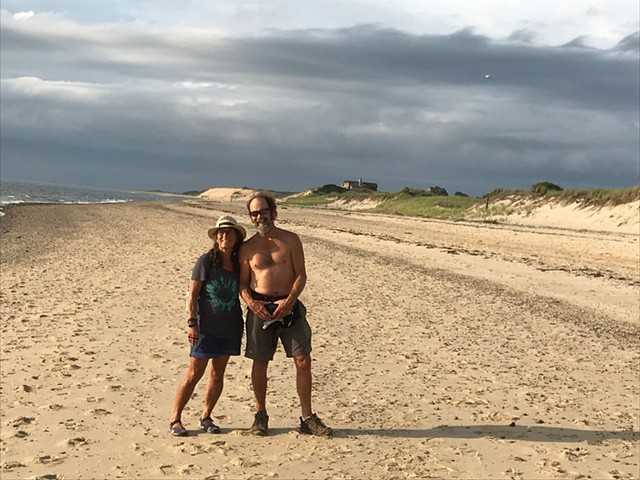
- Courtesy
- Mary Manghis and Glenn Eames on Cape Cod
Her love of good food began young, too. Her Greek American father was an accomplished cook, and "all the kids would gather" at their house, Glenn said.
Although Mary earned a degree in early childhood education, food and agriculture called to her. Shortly after college, she married her high school sweetheart, Joel Jenne, and they bought a New Hampshire farm with another couple. Mary, an animal lover, became vegetarian then, Glenn said: "When it finally came to slaughtering the animals, that was it for Mary."
After selling the farm, Mary, Joel and two friends opened a vegetarian restaurant in Laconia, N.H., in 1978. At the time, Glenn owned a small business nearby with his then-wife. His older sister worked at the restaurant, and he became a regular, stopping by for veggie lasagna, spanakopita and baklava.
Coincidentally, Glenn and his wife were splitting amicably around the time Mary and Joel decided to part ways. "I sent away for a divorce kit from the National Organization for Women for a $25 donation, I think," Glenn recalled. It was simply a friendly gesture, he said, when he loaned the kit to Joel.
When Glenn's sister learned that Mary was going contra dancing, she suggested that Mary invite him. Glenn was not a dancer, but he went. The two started hiking and biking together.
"What I really loved about her was, she wasn't preoccupied with things," Glenn reminisced. Where others might collect possessions, Mary gathered experiences and nurtured relationships. She had zero interest in doing anything for show. "She didn't speak unless she had something to say," Glenn said.
In 1982, the couple embarked on an epic, two-year global bike trip. For $2,500 each per year — including multistop, one-way airline tickets — they adventured through southern Europe, India, Southeast Asia, Asia, and North Africa. They mostly camped, indulged occasionally at corner tea shops and skinny-dipped in every cold stream or waterfall. "She wasn't shy about that at all," Glenn said with a chuckle.
His partner never lost her cool, Glenn said, even as they weathered a Lord of the Flies-style encounter with a pack of youngsters in Kosovo, who dragged a log across their path; a lengthy wait for their bikes in India after a luggage snafu; and an unwelcome two-month break near the Morocco-Algeria border while Mary recovered from hepatitis A.
During their forced downtime, they became fast friends with Peace Corps volunteer Amy Reynolds. She was house-sitting for the owners of an English-language bookstore, who had offered the couple a room while Mary recovered. Reynolds remembers laughter shared over travel tales, the delicious pancakes Mary whipped up and the pair's self-sufficiency.
In 1986, Mary and Glenn were living in San Francisco, where Mary worked at the Tassajara Zen Mountain Center's legendary bakery. Reynolds had moved to Burlington and urged them to join her.
Naturally, Mary and Glenn biked much of the way along the mountain chains from Santa Barbara, Calif., up to British Columbia. In Banff, Alberta, they hopped a train to Montréal and biked down to Burlington, where they crashed with their friend.
The trio remained close even after Reynolds moved. That Mary thrived at the co-op made sense to her old friend. "She needed to be doing something life-giving, nurturing," Reynolds said.
At City Market, Zareva said, Mary would start early-summer workdays by admiring the freshly watered pansies for sale. She grew them at home and told Zareva "it always felt like all of these faces smiling up at her."
Mary cultivated her partnerships with farmers as carefully as she tended her gardens. She understood how important consistency was to them, planned meticulously and honored every commitment.
Following City Market's move downtown, Harlow said, it became the largest outlet for local food in the state. Mary built a database to manage the "extremely huge and complicated puzzle" of projections, orders and vendors. "She evolved into it in a really beautiful way," Harlow said, "not only for herself personally but for the local food economy."
Former City Market general manager Clem Nilan said Mary could easily have climbed the management ladder but had no interest. "She was very grounded about what she wanted to do and how she could make a difference," he said.
As part of Mary's memorial celebration in June, friends planned a bike ride from Battery Park to the Intervale. When the forecast called for rain, numbers dwindled, though a hearty dozen still biked — as Mary undoubtedly would have.

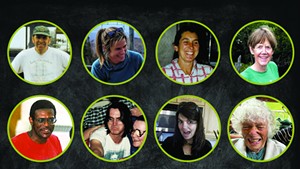
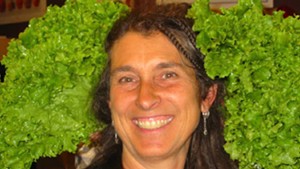

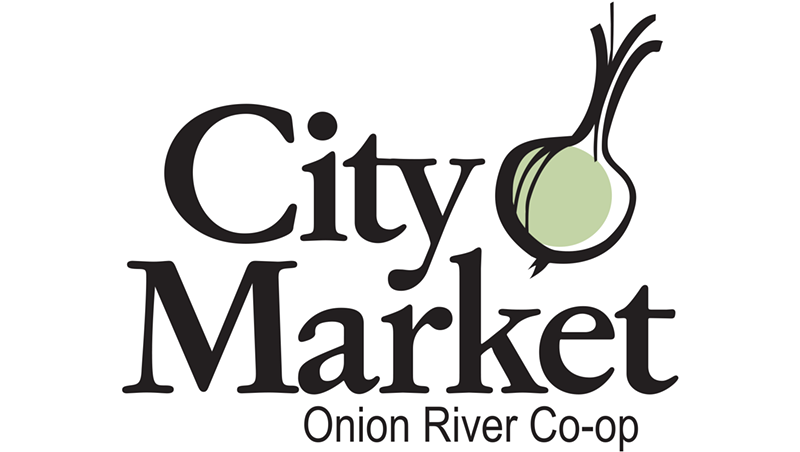











Comments
Comments are closed.
From 2014-2020, Seven Days allowed readers to comment on all stories posted on our website. While we've appreciated the suggestions and insights, right now Seven Days is prioritizing our core mission — producing high-quality, responsible local journalism — over moderating online debates between readers.
To criticize, correct or praise our reporting, please send us a letter to the editor or send us a tip. We’ll check it out and report the results.
Online comments may return when we have better tech tools for managing them. Thanks for reading.